More episodes
View all episodes

Mark Sleboda: US DROPS THE HAMMER! Russia & Iran FIRE BACK, Yemen STRIKES Israeli Ships
01:09:33|Nima Rostami AlkhorshidWhat is your take on the Axios report about Putin urging Iran to accept a zero-enrichment deal with the U.S.?How do you assess the recent 12-day conflict between Iran and Israel, particularly Netanyahu’s goal of regime change?Do you think Netanyahu’s visit to the U.S. is related to Trump’s domestic issues like the Epstein file revelations?How do you interpret the political dynamics in Washington regarding sanctions against Russia, especially Lindsey Graham’s push for “bone-crushing” measures?What is your view on the implications of Trump sending limited military aid to Ukraine and how it affects the war's trajectory?Mark Sleboda:The Axios story lacks credible sources and fits a pattern of Western disinformation aimed at destabilizing Iran-Russia relations.The 12-day war was an attempted decapitation strike by Israel but failed due to Iranian resilience and resulted in rallying public support around the government.While Trump faces internal pressures, Netanyahu’s visit is more about leveraging U.S. support for further military action against Iran rather than covering up scandals.U.S. lawmakers like Graham are pushing unrealistic sanctions that target global trade partners of Russia, showing ignorance of global market realities and likely to fail.The U.S. is constrained militarily, especially in air defense capabilities, making any significant shift in Ukraine unlikely; sending minimal weapons is largely symbolic and ineffective.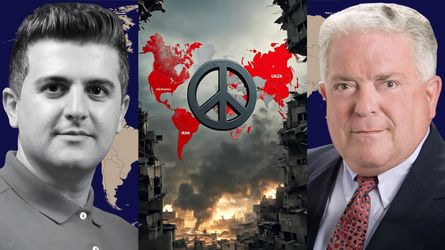
Amb. Chas Freeman: WAR ZONES, Can China Ukraine, Gaza & Iran EVER Achieve Peace
54:54|Nima Rostami Alkhorshid:What are the crucial issues in the current U.S.-China relationship?How do Chinese officials perceive the differences between the U.S. and China?What is Europe’s stance on the Ukraine conflict, and how effective is it?How do you view Trump’s foreign policy decisions regarding Brazil and Japan?What is Iran’s position toward potential negotiations with the U.S.?Amb. Chas Freeman:The U.S. has chosen China as an adversary due to internal dissatisfaction, not global realities, with both political parties aligned against China despite its economic rise.Chinese leaders see U.S. actions as irrational and driven by pride over losing dominance, misunderstanding China’s governance model and policies.Europe is divided and lacks a coherent strategy in Ukraine, continuing ineffective support while ignoring greater humanitarian crises elsewhere.Trump’s erratic behavior alienates allies like Brazil and Japan, undermining diplomacy and damaging long-standing international relationships.Iran wants dialogue but sees no sincerity or guarantees from the U.S., which remains under Israeli influence, blocking meaningful engagement.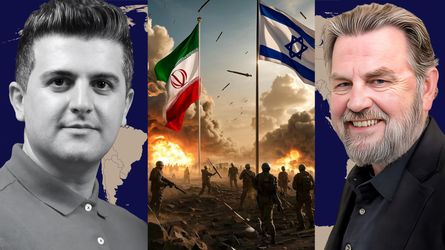
Larry C. Johnson: Russia Advances! - Yemen DESTROYS Israeli Ships, Israel's Iran Strike SUICIDE
01:12:22|Nima Rostami Alkhorshid:What is the current situation in Ukraine, and why is Russia advancing?How effective is Western support for Ukraine, especially regarding military aid?Is Europe capable of standing up to Russia militarily?What are the implications of Trump's policies toward Ukraine and Russia?Is there a realistic path to ending the war in Ukraine?Larry C. Johnson:Russia is making significant advances in Ukraine due to superior military pressure, particularly in Zaporizhia and other regions, while Ukraine’s air defenses are overwhelmed.Western support, including limited aid like 10 Patriot missiles, is insufficient against Russia’s scale of attacks and ineffective in halting its progress.Europe is described as incapable of matching Russia militarily and appears increasingly divided or ineffective in responding to the crisis.Trump’s erratic behavior and lack of coherent strategy raise concerns, with his actions seen as potentially worsening the conflict and global instability.A military defeat of Ukraine seems likely unless there is a major shift, as Russia intensifies operations and aims to consolidate territorial gains.

Graham E. Fuller: Can the U.S. Escape Its Strategic DISASTERS, A NEW REVOLUTION Begins
48:38|Nima Rostami Alkhorshid:Why does Donald Trump praise Putin during their conversations, despite feeling let down by Russia's actions?Is there confusion in Washington about who is making key decisions, such as halting ammunition shipments to Ukraine?How much does Trump truly understand about the complexities of the Ukraine conflict and foreign policy in general?Who might be influencing Trump’s foreign policy behind the scenes, and why has Steve Witkoff seemingly lost influence?Given Israel’s strong influence over U.S. policy, do you believe Trump could engage in direct talks with Iran despite Israeli objections?Graham E. Fuller:Trump likely praises Putin instinctively but grows frustrated as he realizes Putin’s demands are unreasonable and non-negotiable.There appears to be internal confusion and lack of clarity in the Trump administration, especially on major foreign policy decisions like military aid to Ukraine.Trump receives intelligence reports, but his erratic nature and reliance on personal instincts mean his understanding is inconsistent and unpredictable.Steve Witkoff had significant influence due to his diplomatic approach, but others like Rubio may now be sidelining him, possibly with backing from pro-Israel factions.Despite Israeli pressure, Trump may still consider negotiations with Iran if he believes a hardline approach could lead to future diplomatic gains or regional stability.
Richard Wolff & Michael Hudson: The US is BLIND to BRICS, And It's Crushing America's Future!
01:04:47|Nima Rostami Alkhorshid:What is the significance of the BRICS summit in Brazil, particularly regarding global economic dynamics?How do tariffs imposed by the U.S., such as those on Brazil, affect international trade and relations?Why are the BRICS countries struggling to create a unified alternative to the Western economic system?What role does the U.S. play in dividing and weakening the BRICS alliance through economic policies?How does the concept of "grabization" explain the current economic behavior of the U.S. and its allies?Michael Hudson:The BRICS summit highlights the shift from U.S.-dominated globalization to a multipolar world where countries seek independence from Western financial systems.Tariffs like those imposed on Brazil aim to bully nations into submission, but they also push BRICS countries to strengthen internal trade and reduce reliance on the U.S.BRICS lacks a clear blueprint for breaking away from neoliberalism, with members more reactive than proactive in forming new economic institutions.The U.S. exploits divisions within BRICS—especially using India and Brazil—to prevent a united front against American economic dominance.“Grabization” refers to elites stripping resources for short-term gain, mirroring the Soviet Union’s collapse and currently seen in U.S. policies.Richard Wolff:The BRICS’ achievements, like $1 trillion in internal trade, show progress despite differences, partly driven by Trump’s tariffs pushing them together.Tariffs primarily hurt American consumers, not foreign exporters, creating inflationary pressures that could undermine U.S. competitiveness.BRICS remains divided due to geopolitical maneuvering, similar to how European distrust hampers unity among nations.Lula’s stance on globalization emphasizes that the issue isn’t globalization itself, but U.S. imperialism using it for domination.BRICS must redefine economic development beyond capitalism, embracing cooperative models that prioritize community over profit-driven monopolies.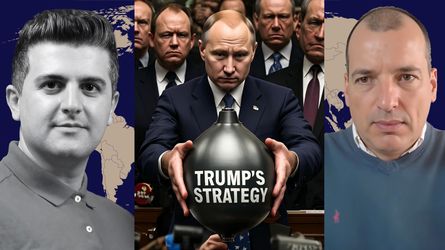
Alex Krainer: PUTIN DROPS BOMBSHELL on Trump's Strategy
01:19:08|Nima Rostami Alkhorshid:What is your assessment of the recent tensions between the U.S. and Russia?How do you interpret Trump’s rhetoric toward Putin and its implications?What role does the sanctions bill on Russia play in U.S. foreign policy?How effective has the Trump administration been in dealing with international conflicts?What are your thoughts on the geopolitical impact of the BRICS summit?Alex Krainer:Trump's rhetoric appears inconsistent, making it hard to gauge genuine policy intentions.His statements about Putin seem tailored for domestic audiences rather than reflecting real diplomatic progress.The sanctions bill highlights internal divisions within the administration, as Trump maintains discretionary control.The administration struggles with global perception due to erratic messaging and unclear strategic goals.The BRICS summit reflects a growing push for multipolarity, challenging Western dominance in global affairs.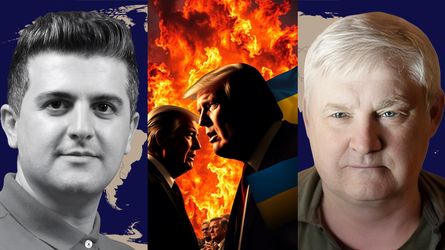
Andrei Martyanov: RUSSIA'S SHOCKING ATTACK Leaves Ukraine in Chaos, Trump SPEECHLESS!
58:54|Nima Rostami Alkhorshid:How do you interpret the current trajectory of U.S. imperialism in comparison to historical British imperialism?What are your thoughts on the decline of American industrial and military capabilities?How significant is the transformation within BRICS, especially with countries like Indonesia joining?What is your view on Donald Trump's inconsistent foreign policy statements, particularly regarding Ukraine?How do you assess Germany’s militarization efforts and their implications for Russia?Andrei Martyanov:The U.S. has degenerated into an empire due to financial capitalism and imperial overreach, mirroring the British Empire but lacking sustainable economic foundations.The U.S. lacks real industrial capacity and operational military experience, rendering its forces ineffective against modern adversaries like Russia.BRICS represents a major shift toward a multipolar world order, challenging Western-dominated institutions and moving toward independent financial systems.Trump operates from a delusional worldview, driven by narcissism and ignorance of geopolitics, making his policies erratic and untrustworthy.Germany's militarization is a joke; its industry is outdated, and its political elite harbor deep anti-Russian sentiments rooted in WWII history.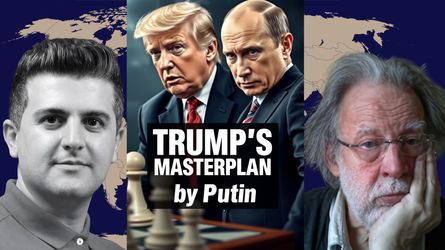
John Helmer: Trump's Masterplan DESTROYED by Putin in One Move!
59:40|Nima Rostami Alkhorshid:What is the significance of Donald Trump’s changing stance on sending weapons to Ukraine?How does Trump’s rhetoric and behavior affect U.S.-Russia relations?Is Trump’s approach to foreign policy driven by domestic political considerations?What role does NATO play in the ongoing conflict in Ukraine?How might the current geopolitical tensions impact global stability?John Helmer:Trump’s shifting stance reflects internal pressures within Washington and his administration's lack of a coherent strategy.His rhetoric, including expletives and personal attacks, undermines diplomatic efforts and escalates tensions with Russia.Yes, Trump is likely adjusting his foreign policy to appeal to his political base and boost his re-election prospects.NATO remains a key player, but its unity is tested as member states differ on military support for Ukraine.The situation could lead to further fragmentation in international relations and increase the risk of broader conflict.
